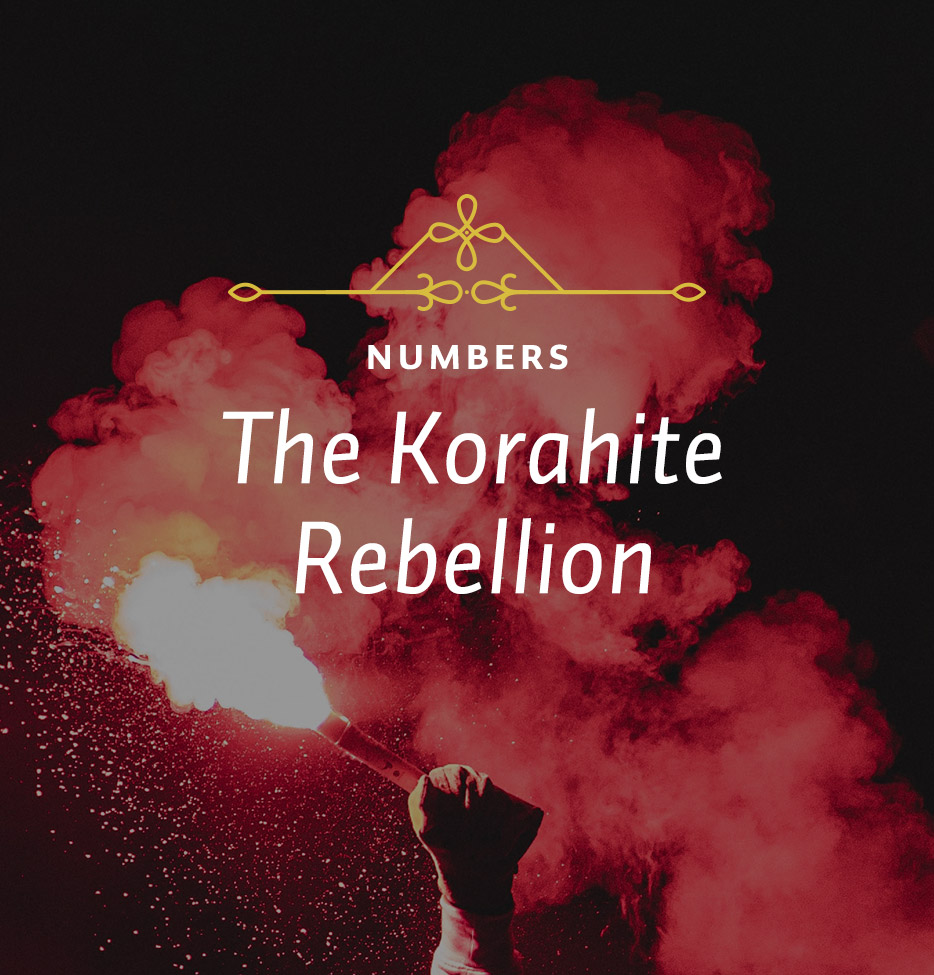Before Jesus returned to heaven, He told His disciples that as long as they were in the world, they were going to have trouble and tribulation. If that’s true of disciples in general, it’s certainly true of leaders. We see that point illustrated very dramatically in the case of Moses in the book of Numbers. Opposition, rebellion, criticism, and grumbling were directed against Moses as the leader of the people. We have seen this theme of opposition a number of times since Numbers 11—from the rabble, from the people as a whole, and from Moses’ own intimate family circle: his brother Aaron and his sister Miriam. Opposition also comes as a result of the negative report from the ten spies. Of the twelve spies who had gone into the land, ten came back with a negative report, while only two, Joshua and Caleb, had faith that God would give them the land that He had promised to give them. But the people listened to the unbelieving ten, and they were actually ready to stone Moses and Aaron and then elect another leader who would take them back to Egypt.
In chapters 16 and 17, opposition is now coming from the leaders of the people. So the general spirit of rebellion that began with the rabble and spread to the people is here focused on a group of leaders: a man named Korah, three leaders from the tribe of Reuben—Dathan, Abiram, and On—and then 250 other leaders, presumably elders or men of distinction from the other tribes. Now that was a formidable opposition, which is why this story is so significant.
Although the rebellion in part was against Moses, and Moses has to deal with it, the true focal point is Aaron, who is the high priest. Korah, and perhaps others, wanted to take over the priesthood. What’s at issue here is the priesthood and the sacrifices appointed by God for the priesthood to carry out, and therefore the way of salvation. Are human beings able to determine how to approach God, or is it something that God must determine? That’s the issue that is raised and settled so dramatically in the case of the destruction of those who led this rebellion. These chapters show the priesthood’s divine origin, sacred character, cultic role, and above all its expiatory function.
We don’t know when the stories in these two chapters took place. They could have been relatively early in the forty years of wandering, or they could have come relatively late. We aren’t told the time. The reason Korah’s rebellion is placed here seems to be because of the verses immediately before this. Numbers 15:37-40 tells us that the people were all to have tassels on their garments, with a blue thread on the tassel to symbolize that they were set apart to God, blue being a symbolic color for purity or holiness. Korah picked up on this idea, and, like most errors, Korah’s error had some truth to it. He said, “Look, God has been showing us that all we Hebrew people are holy. Therefore you, Moses and Aaron, you’ve gone too far in taking upon yourself the special leadership of the people.”
Now it’s true that the people were appointed to be holy. The entire book of Leviticus is meant to teach us that. Its theme is “Be holy, because I the LORD your God am holy.” But that truth doesn’t undermine the other truth that God had determined who should be the priest, who should assist him, how the sacrifices were to be made, and by whom. And so when Korah and those who rebelled with him took upon themselves to intrude on that role, God judges them. As a matter of fact, He judges them so severely that by the end of chapter 17 the people are crying out for a mediator: “We will die! We are lost, we are all lost! Anyone who even comes near the tabernacle of the LORD will die. Are we all going to die?” (v. 13). And the answer is yes, unless God provides a mediator. His mediator is symbolized by the choice of Aaron.
Of the men who are introduced in Numbers 16:1-2, one of the Reubenites—On, the son of Peleth—is not mentioned again. That may very well suggest that somewhere along the line he began to realize what was going on and how dangerous this all was, and pulled back from the very brink of destruction. If that’s the case, we have a lesson of the mercy of God and the possibility of repentance right at the very beginning of the story.
We also see God’s mercy in that while Korah is judged, the sons of Korah were spared. They seem to have disassociated themselves from the sin of their father at this point and lived to continue Korah’s line. As a matter of fact, they became very prominent in the history of Israel, and several of the Psalms (42, 45-49, 84-85, 87-88) are attributed to Korah’s sons. Although it is true that sin often continues in families and that sins of the fathers are visited upon the children, it’s not always the case. Here we have a case to the contrary.






